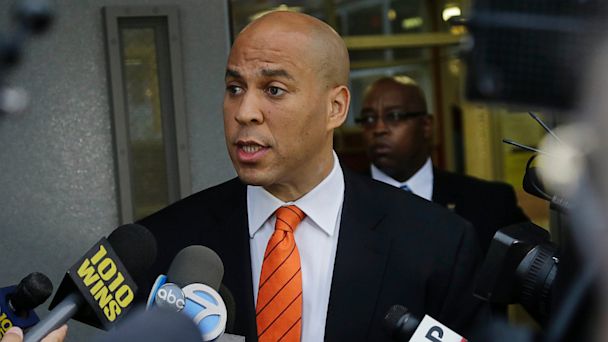More Money, More Problems for Cory Booker

(Mel Evans/AP Photo)
Cory Booker is poised to cruise his way to the Democratic nomination for New Jersey's open Senate seat today, with polls showing him double digits ahead of his competitors.
But following him like a trail of dust on a dirt road are ethical questions about whether he used his celebrity as the Twitter-happy mayor of Newark, and his potential ascension to the U.S. Senate, to raise $1.7 million from wealthy tech executives for a nascent tech startup, Waywire.
"Essentially, they've turned him into a millionaire," said Craig Holman, government affairs lobbyist at Public Citizen, a government ethics watchdog group. "What kind of influence is that going to have over Cory Booker's decisions when it affects those particular clients?"
Details of Booker's relationship with Waywire, a company he co-founded, were reported in a front-page New York Times article last week. They detailed Booker's heavy involvement in soliciting donations for the venture from wealthy donors, including Google's executive chairman, Eric E. Schmidt, and Oprah Winfrey.
Booker's stake in the site, whose mission is murky but deals with online video discovery, accounts for between $1 million and $5 million of Booker's personal net worth, according to financial disclosure forms.
Both he and his office have tried to downplay his involvement in the startup and to deflect ethical questions by saying that Booker is not involved in the day-to-day operations of the company and he will step down from the board if he's elected to the Senate.
But if Booker were a senator right now, it would be illegal for him to be involved in the business, Holman said.
Government ethics watchdogs said he needs to do more if he's going to remove the perception of impropriety.
A spokesman for Booker said that he will prohibit his office from doing work on behalf of Waywire, will prohibit Waywire from lobbying his office, and will not do any legislative work where Waywire is the sole beneficiary.
But Holman said he should probably recuse himself from any pending business involving the company's investors - including Google.
"It isn't an issue as to whether Booker is playing an active role in running the company," Holman said. "The potential conflict of interest is in the people financing this business."
As a senator, Booker would also have to fully disclose his financial stake in Waywire or any other investments.
After initially leaving details of his financial interest in the company off city and federal Senate financial forms, Booker's campaign amended both reports to reflect his ownership of the company, which could equal more than double the value of his other assets.
Booker's interest in the company may either never be realized (if the company fails), or could eventually make him wealthy (if the company succeeds). In the meantime, he has agreed to put his stake in the company into a blind trust, which, theoretically, he can't control if he becomes senator.
It's a satisfactory solution, ethics watchdogs said, but its less meaningful if the fund comes from only one source - Waywire - and Booker has to personally sign off on financial disclosure forms that disclose the value of those funds every year.
"It's fairly common for members of Congress to use blind trusts so they don't have to sell anything off," said Adam Smith of Public Campaign, a non-partisan campaign finance reform organization. "If it's a blind trust, it's not that blind when you only have one investment."